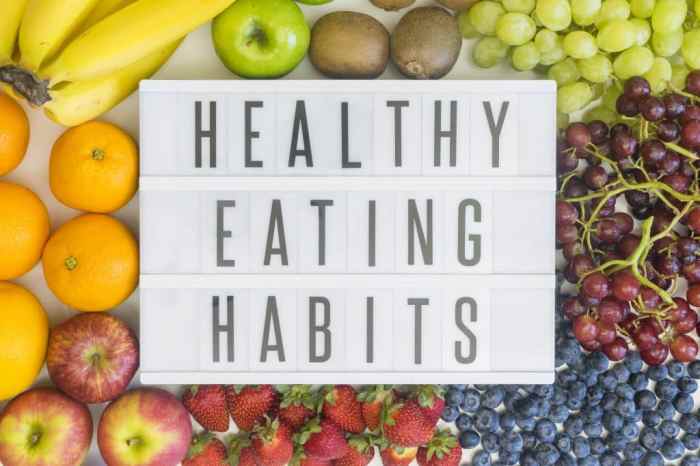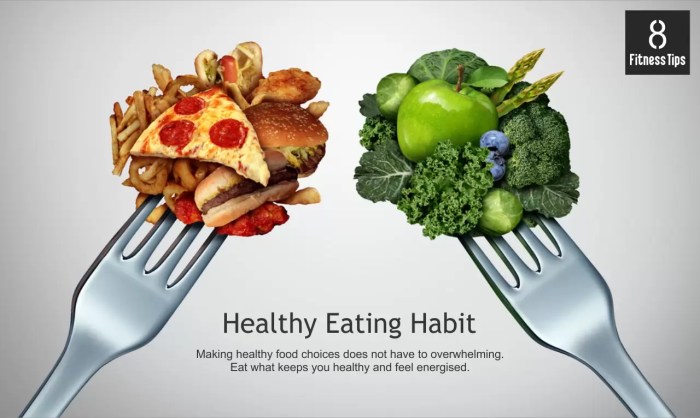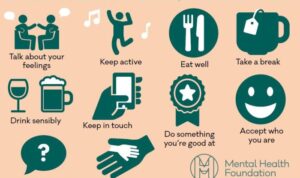Healthy Eating Habits sets the stage for a life-changing journey towards optimal health and vitality, where every bite counts in the grand scheme of your well-being. Get ready to explore the world of nutritious choices and mindful consumption in a way that screams high school hip vibes!
Let’s dive into the essence of a balanced diet, the magic of portion control, and the art of meal planning to revolutionize your eating habits for the better.
Benefits of Healthy Eating Habits
Eating a balanced diet is crucial for maintaining good health. It provides the body with the necessary nutrients to function properly and stay energized. Healthy eating habits can lead to overall well-being by boosting immunity, improving cognitive function, and reducing the risk of chronic diseases.
Essential Nutrients for Good Health
- Vitamins: These micronutrients are essential for various bodily functions, such as immune system support, energy production, and cell growth.
- Proteins: They are the building blocks of our body, necessary for muscle repair, enzyme production, and overall growth and development.
- Minerals: Important for maintaining fluid balance, nerve function, and bone health. Examples include calcium, iron, and potassium.
- Fiber: Aids in digestion, helps regulate blood sugar levels, and promotes a healthy gut microbiome.
Components of a Healthy Diet: Healthy Eating Habits

Eating a variety of foods is essential for maintaining a healthy diet. Including different food groups in your meals ensures that you are getting all the necessary nutrients your body needs to function properly.
Food Groups in a Balanced Diet
- Fruits: These are rich in vitamins, minerals, and fiber, which are important for overall health.
- Vegetables: Another great source of vitamins, minerals, and fiber that are essential for a healthy diet.
- Proteins: Foods like lean meats, poultry, fish, beans, and nuts provide the body with the necessary building blocks for muscle growth and repair.
- Whole Grains: Foods like brown rice, whole wheat bread, and oats are important sources of energy and fiber.
- Dairy: Milk, cheese, and yogurt are good sources of calcium, which is vital for strong bones and teeth.
Significance of Portion Control
Maintaining proper portion control is crucial in managing weight and preventing overeating. By being mindful of serving sizes, you can prevent consuming excess calories and maintain a healthy weight. It also helps in balancing the intake of different nutrients throughout the day.
Role of Hydration, Healthy Eating Habits
Drinking an adequate amount of water is essential for maintaining hydration and aiding in various bodily functions. Water helps regulate body temperature, transport nutrients, and flush out toxins.
Make sure to drink enough water throughout the day to stay hydrated and support overall health.
Tips for Developing Healthy Eating Habits
Eating healthy is not just about what you eat, but also how you plan your meals, incorporate fruits and vegetables, and practice mindful eating.
Meal Planning Strategies
Planning your meals ahead of time can help you make healthier choices throughout the week. Consider creating a weekly meal plan, making a grocery list, and prepping ingredients in advance. This can save you time and prevent you from resorting to unhealthy fast food options when you’re in a rush.
Incorporating Fruits and Vegetables
One way to increase your intake of fruits and vegetables is to make them the star of your meals. Try adding a variety of colorful fruits and veggies to your plate, whether it’s in a salad, smoothie, stir-fry, or as a side dish. You can also snack on fruits and veggies throughout the day to boost your nutrient intake.
Mindful Eating Practices
Mindful eating involves paying attention to your food choices, listening to your body’s hunger and fullness cues, and savoring each bite. Avoid distractions while eating, such as watching TV or scrolling on your phone, and focus on the flavors and textures of your food. This can help prevent overeating and promote a healthier relationship with food.
Impact of Healthy Eating on Mental Health

Eating a nutritious diet not only benefits your physical health but also plays a crucial role in supporting your mental well-being. The food you consume can have a significant impact on your mood, cognitive function, and overall mental health.
Nutrients that Affect Mood and Cognitive Function
Certain nutrients play a key role in regulating mood and cognitive function. For example, omega-3 fatty acids found in fatty fish like salmon and walnuts are essential for brain health and have been linked to lower rates of depression. Additionally, foods rich in antioxidants, such as berries and dark chocolate, can help reduce inflammation in the brain and improve mood.
Tips for Maintaining a Healthy Diet to Support Mental Health
- Aim to include a variety of fruits, vegetables, whole grains, lean proteins, and healthy fats in your daily meals to ensure you are getting all the essential nutrients your brain needs.
- Avoid processed foods high in sugar and unhealthy fats, as they can lead to inflammation in the brain and negatively impact mood and cognitive function.
- Stay hydrated by drinking plenty of water throughout the day, as dehydration can impair cognitive function and mood.
- Limit caffeine and alcohol consumption, as excessive intake can disrupt sleep patterns and worsen symptoms of anxiety and depression.
- Practice mindful eating by paying attention to your hunger cues and eating slowly to fully enjoy and digest your food, which can help improve your relationship with food and reduce stress.

